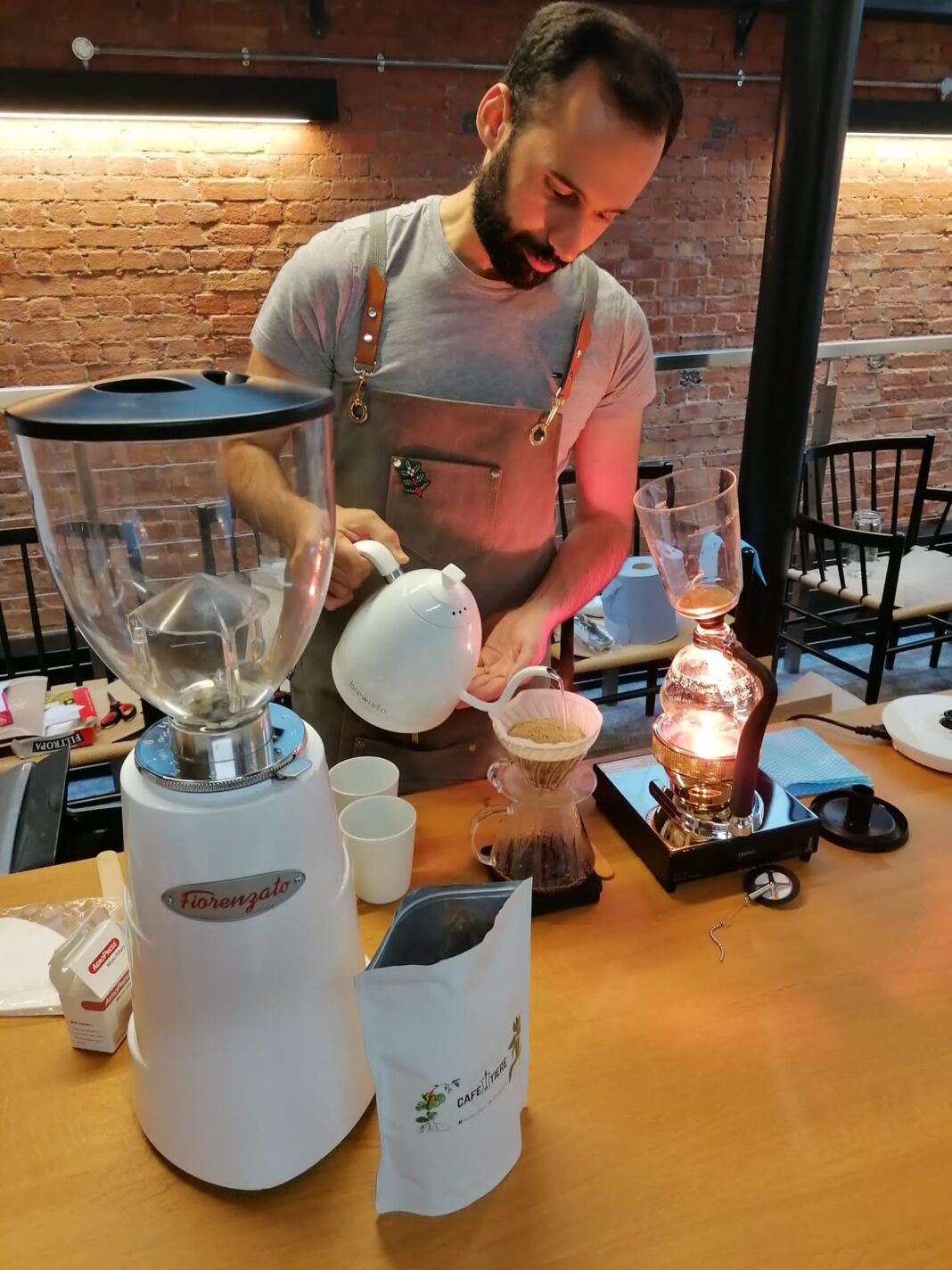MILAN – Another professional who is building his success in the UK from Italy by following his passion for coffee is Mauro Laruffa, founder of Specialty Cafètiere, a company that has brought quality coffee to London at the heart of its philosophy. We spoke to this expert, who started out in Italy and then crossed national borders, about this project, its genesis and the work behind it.
Laruffa starts like that: “My coffee story is quite interesting; I wasn’t expecting my life to turn as it did!”
“I graduated in 2013 and started working as an accountant for an accountancy firm (working is a big word cause I was actually “helping for free”). This is the life my parents wanted, and I thought I could be the right one for me, but in 2015, I decided to learn English, and I left Italy for a “3 Months” trip! 3 Months went too fast, and I decided that I would have needed three more, six months went super-fast, too, and I am still here after seven year.
I fell in love with coffee from the beginning: I started my career in a restaurant as a barback, and the first thing they taught me was how to make espresso. After one month, the company I was working for allowed me to visit a big coffee roastery (the restaurant coffee supplier) and get training for the Sca Barista foundation course, which completely changed my way of looking at coffee.
I kept the work at the restaurant, but at the same time, I found a part-time in a cafe which was the best way to learn about coffee and also customer service. I worked for Notes coffee for more than one year; then I moved to the Department of Coffee and Social Affairs, where I was lucky enough to work in one of the busiest shops in London, the Carnaby Street branch, making more than 600 cups per day, all manually tamped!
In my spare time, I was visiting and tasting all of London’s cafes obsessively, looking for the best cup of Coffee and also inspiration. My necessary experience was at Prufrock, where I was lucky to be and meet several great professionals who also trained me for all further Sca courses.
Prufrock is the cafè I dream about, with three seats at the Brewing Counter where you can chat with the barista making your drink. It’s the best coffee shop in London. When all this was happening, my cousin came several times to visit me, and we started dreaming about our coffee shop from the beginning.
I feel at this point to introduce my cousin, Paolo Giovinazzo, owner and manager of Caffè Cannizzaro, a coffee roastery running Since 1960, operating in south Italy, and now a bit spread in Europe and some parts of the world, thanks also to the excellent connections developed in London.
Paolo is another coffee lover and passionate about his job, living in a challenging environment and fighting every day for a change We started a little bit interesting project, a cultural initiative, called “London Specialty Coffee Tour”, also with Barista & and Matteo Don Giovanni to spread the Specialty Coffee Culture and the completely different approach to Coffee to the south of Italy. For two years, we guided many Bar owners and coffee lovers from many different places in Italy to London. I organized all visits and courses to many Cafes and Roasteries, arranging accommodation, lunch and dinner for all of them.
It was a fantastic experience, which helped me get to know many people who gave me lots of helpful info and recommendations for my future projects and helped everyone who could leave for a small amount of time, our little world and immerge into a vast and unpredictable coffee Jungle. In 2020 we had to stop the project due to Covid, but we will carry on once the situation is safer for everybody. Another important person I met during my coffee journey was Ivica Cvetanovski, co-founder of Coffea Circulor, and trainer of
the Roaster Champion Rubens Gardelli.
For years, he has been my guide, helping develop my palate, sending a crazy amount of many coffee varieties and origins from his roastery in Sweden. His Nordic approach to coffee was crucial for me to understand what I like and want in my cup of coffee.”
Laruffa continues the storytelling: “Just before Covid started, my cousin and I decided to open our coffee company in the UK, Specialty Cafètiere”
“Which slowly started to move first steps, importing coffee from Italy, and Specialty from Sweden (IVICA) supplying some restaurants and bars with our blends and also providing pieces of equipment and training. Chasing the dream, in 2020, we managed to open our first mini cafè, a coffee hatch, in the famous Columbia Road (where every Sunday take places the flower market), opened only Saturday and Sunday, which was for months the only spot opened in the road, where every business was shut due to covid!
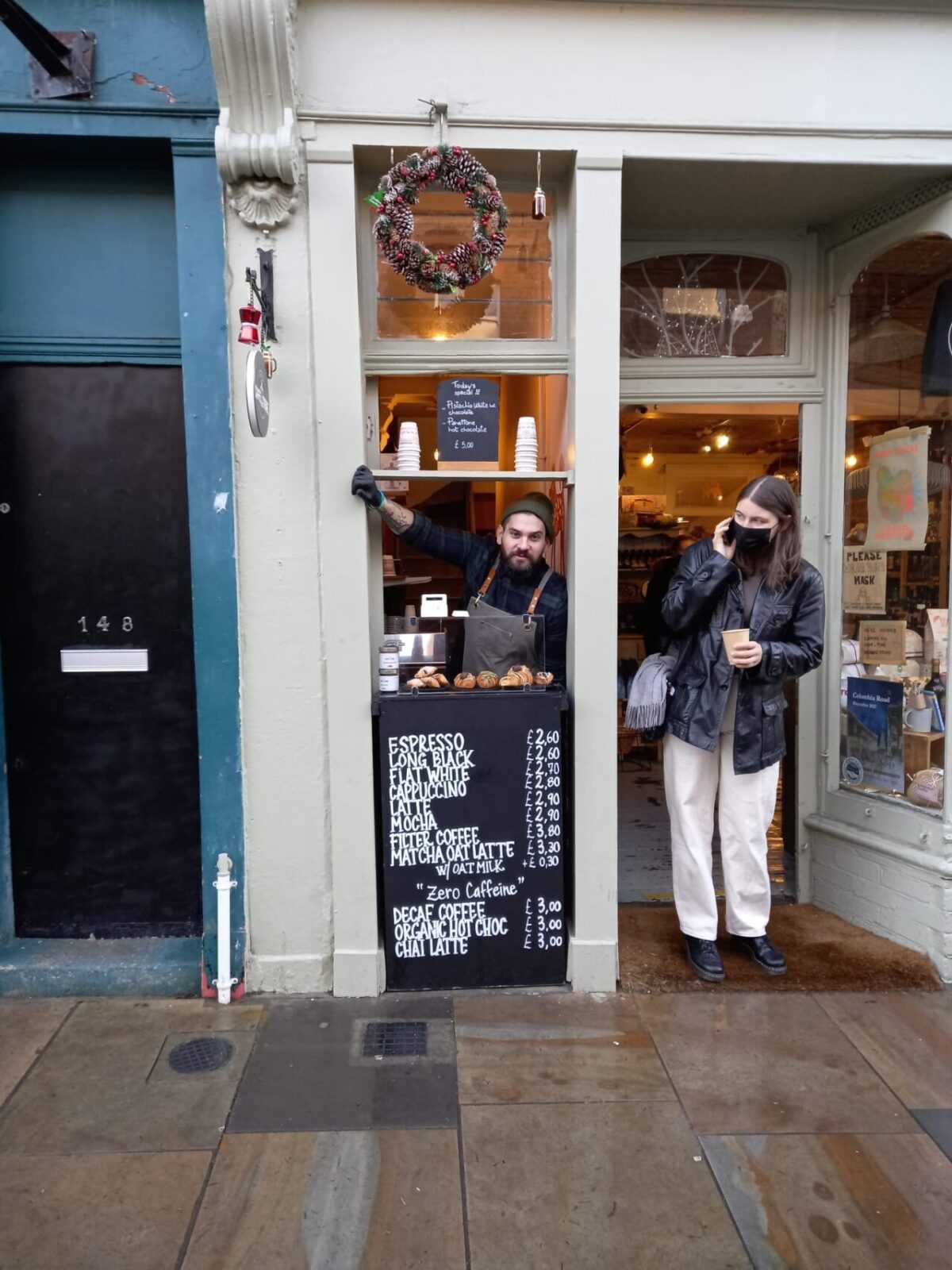
When restrictions were released, the market got busy. We became pretty popular in the area, for Coffee and for filling croissants at the moment, especially with Pistachio Nutella, something that wasn’t very popular in the UK.
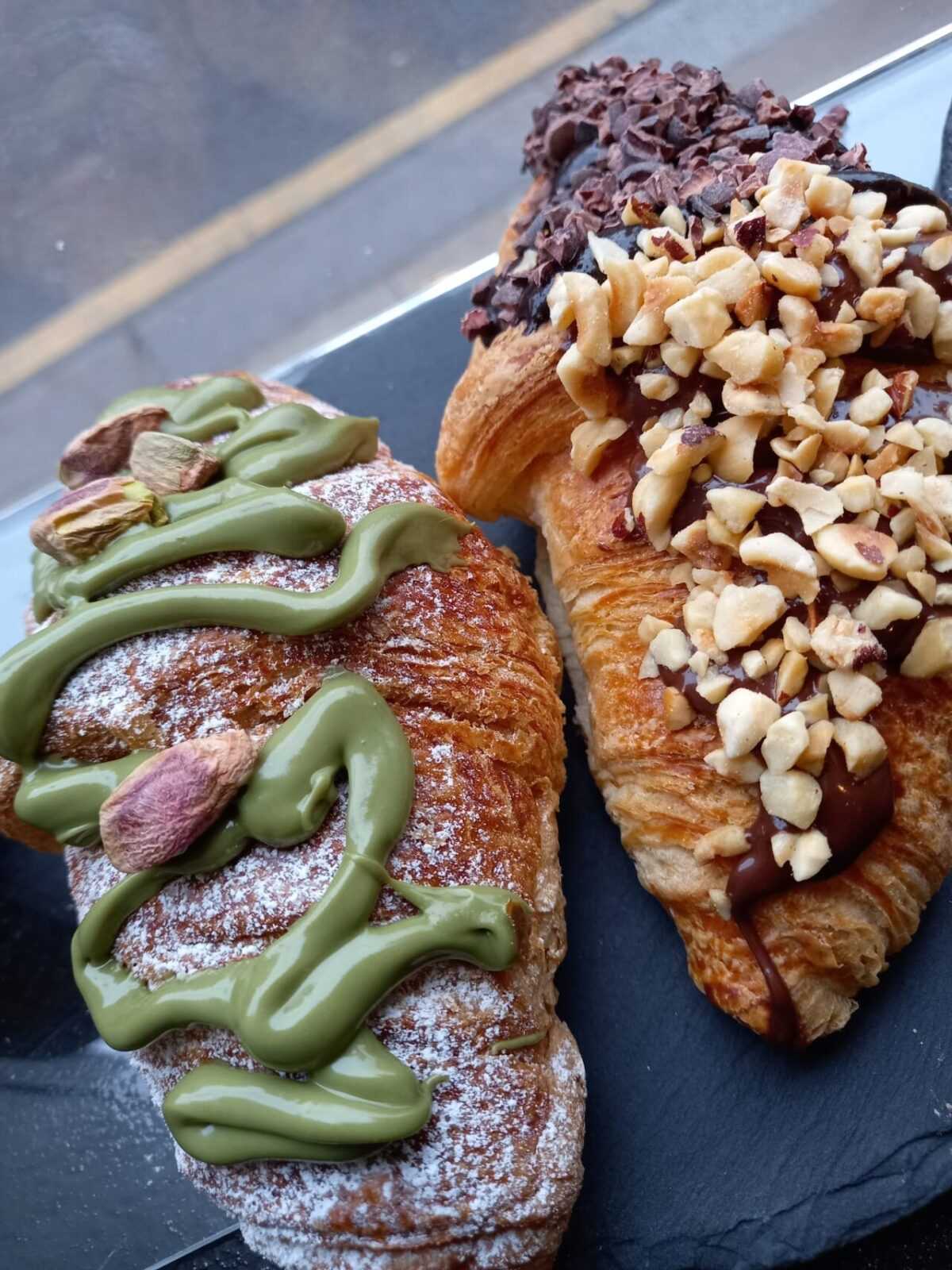
We loved the area and wanted to be there, so we finally found our weekly spot, and we are now refurbishing and making a cafè with a sitting room and roasting laboratory, which will be ready by the end of February. Save the address: 389 Hackney Road – E28PP London. We will also be showcasing all our products and services thanks to cooperation with La Marzocco, Fiorenzato, Digel and many other brands we distribute. – Laruffa is inspired -This is what I always dreamed about, having a little space where roasting and brewing single-origin coffees on demand, guiding customers through the many beautiful
flavours a cup of Coffee can offer.”
Doing Coffee in London is hard, especially after Covid
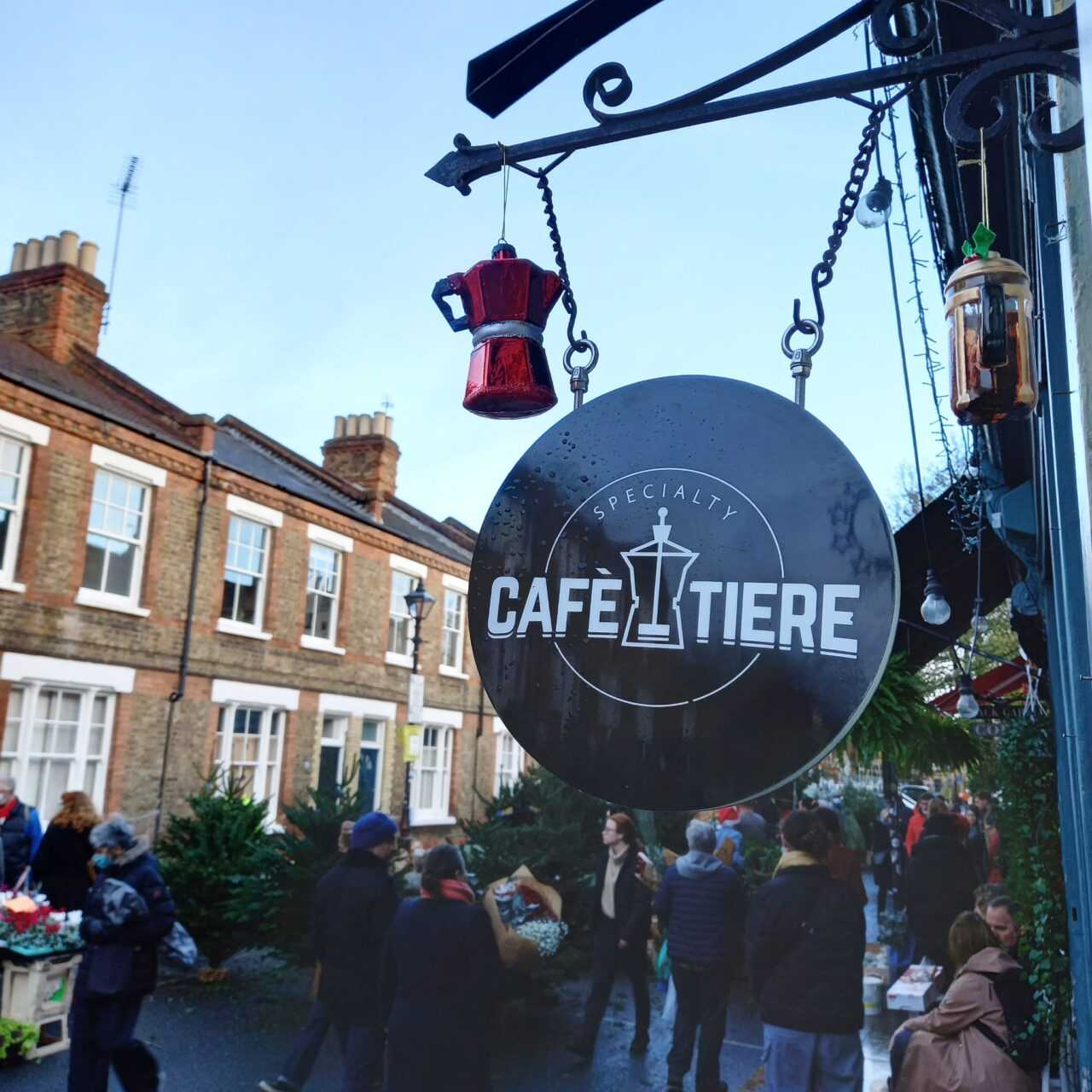
“I saw many positive changes and many negatives. For two years, Cafè and Bars were the only business to be allowed to open for takeaway, so everyone started opening cafes, using the word Specialty Coffee too quickly. At the same time, it kept the coffee industry up and running and employed many people, which is always great! Competition is crazy, and you need to be special to stand out from the crowd.
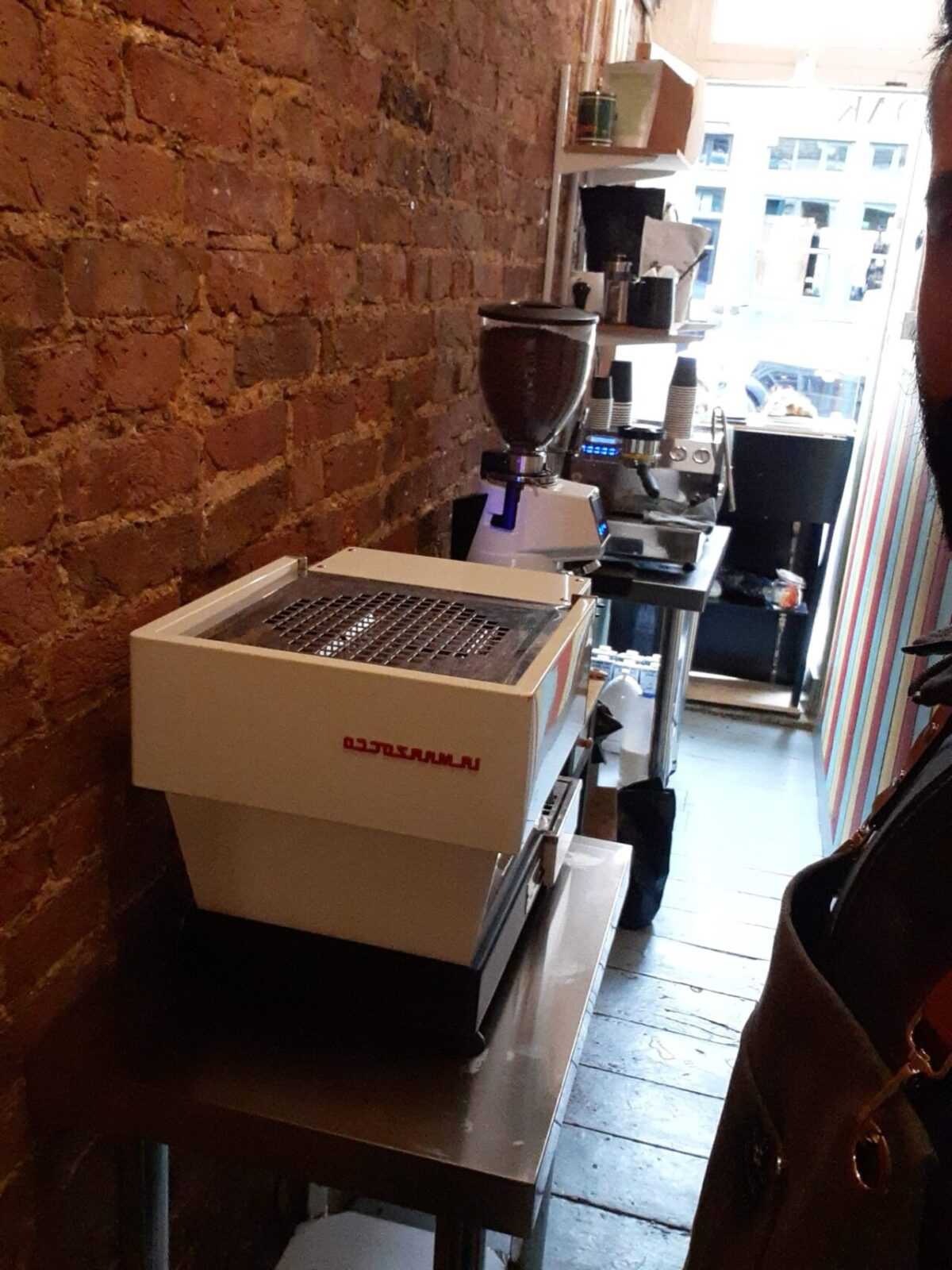
I don’t believe that this can’t be done in Italy, it probably would have taken more time, but I am sure I would have made it anyway. It’s all about passion; your passion can make everything possible.”
About the quality shifts, Laruffa said: The process is slower because our traditions and roots are too strong; it’s tough to change a trend in Italy.
“We invented the espresso machine, made a bitter drink, adjusted towards the “Italian palate”, and that’s it; we stopped the progress and the research. For decades we drank mainly bad coffee, and we have also become famous for it in the world. This shows a lot; this show how stubborn and determined we are.
But in this new world, this is not enough anymore: anyone is much more aware of limited world resources, and customers want to know always more about the products they buy. Traceability is crucial, and anyone wants to look at the label and see the composition and where it is coming from, writing at the back “blend of roasted coffee” is not enough anymore.”
Laruffa, what motivates you to stay abroad instead of returning to Italy?
“Diversity keeps me in the Uk, people from all over the world living here, and you always learn something new! My growth here is faster ten times than it can be in Italy; in 7 years of London, I became 16 years older. I can be myself in here. Nobody judges you for who you are and what you do; everyone is too busy to look at others lives.”
How do you comment on the issue of staff returning to Italy because of Brexit and Covid from the UK?
Laruffa speaks: “It is hard to find workforces now; many went back home, many changed fields altogether. So I don’t believe it is a long term problem, but we need to adapt to the change. Like every crisis, there will be a way up at some point; we need to keep going with what we are doing, do not give up, and adjust accordingly to the change.”
The candidature of traditional Italian espresso coffee for Unesco has been approved in recent days: do you think it will make any kind of difference abroad?
“I firmly believe italian coffee deserves the Unesco”candidacy”; it’s part of our culture, and the ritual behind it is unique and needs to be recognized! On the other hand, I don’t believe we will make any crucial differences abroad, while we are already very famous for making great coffee, at this point, many believe that coffee comes from Italy.”
What do you think Laruffa and how do you think action should be taken to ensure that the increase in prices in Italian bars (finally) coincides with an increase in quality?
“This is a big topic. First of all I would like to point out that I justify the increase in the price of coffee, because in general we are witnessing a rise in the price of all raw materials, which must inevitably also affect the final cup. However, we have to be a bit careful on this issue: I do not justify, for example, the increase in the cost of coffee when we are not working with Arabica coffee, because this is the variety that is most subject to increases. Since we know very well that in Italy Robusta is mainly used, I don’t totally agree with the idea of increasing the price without a different choice of raw material.
So let’s give more information about the price increase: I don’t think it should be taken as a rule, but adapted to the specific case. Let me explain better, comparing, beyond the phenomenon of price increases, the costs in the UK with those in Italy: the UK average price for a black coffee (espresso or americano) is around 3 Euros. When you ask for espresso, you generally get a double espresso or Americano; you get a double shot of Americano. Saying that the Bar or cafè will consume between 18g/20g of dry coffee to make your drink. (In the Uk, you can’t even find a single shot portafilter, everyone works with double shot coffee.)
The Bar or Cafè will make around 50 coffees with 1kg of coffee beans. The average price of 1kg of coffee in the Uk goes from 20 to 30 Euros. The final rough cost of the espresso (double) shot will be between 40 and 60 pence.
In Italy, the average price for an espresso is 1 Euro. You generally get a single shot of espresso when you ask for a cup. Saying that the Bar will consume 7g of dry Coffee to make you a drink- The Bar will brew more than 100 coffees with 1kg of coffee beans The average price of 1Kg of Coffee in Italy goes from 12 to 25 Euros. The cost of a shot of espresso (single) will be between 12 and 25 pence. You can see that 1 euro is the right price you should pay for that coffee.
Also, the cost of the Arabica is increasing; the majority of bars in Italy are working with Robusta; why should they raise the price? However, some coffee shops in Italy are already working with international standards, like Ditta Artigianale or Faro Rome, for example, where 1 Euro is not enough for the quality and efforts they put in.
I believe that the price increase doesn’t need to be seen as a rule, but applied honestly if there is for real an increase of the raw material costs. I hope it will be the excuse to have a better quality coffee rather than just paying more for the same “;traditional” cup.”




